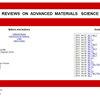Research progress of metal-based additive manufacturing in medical implants
IF 3.6
4区 材料科学
Q2 MATERIALS SCIENCE, MULTIDISCIPLINARY
引用次数: 0
Abstract
Metal-based additive manufacturing has gained significant attention in the field of medical implants over the past decade. The application of 3D-printing technology in medical implants offers several advantages over traditional manufacturing methods, including increased design flexibility for implant customization, reduced lead time for emergency cases, and the ability to create complex geometry shapes for patient-specific implants. In this review study, the working principles and conditions of metal 3D-printing technologies such as selective laser sintering, selective laser melting, and electron beam melting, as well as their applications and advantages in the medical field, are investigated in detail. The application scenarios and research status of non-degradable metals including titanium alloy, medical stainless steel,金属基增材制造在医用植入物中的研究进展
在过去的十年中,金属基增材制造在医疗植入物领域获得了极大的关注。与传统制造方法相比,3d打印技术在医疗植入物中的应用具有几个优势,包括增加植入物定制的设计灵活性,缩短急诊病例的交货时间,以及为特定患者植入物创建复杂几何形状的能力。本文综述了选择性激光烧结、选择性激光熔化和电子束熔化等金属3d打印技术的工作原理和条件,以及它们在医学领域的应用和优势。介绍了钛合金、医用不锈钢等不可降解金属和镁合金等可降解金属作为打印材料的应用场景和研究现状。我们讨论了通过表面修饰、多孔结构设计和成型工艺优化来改善植入物的力学性能和生物相容性。最后,总结了CT成像准确性、制作、植入物放置等方面的生物相容性问题和挑战。
本文章由计算机程序翻译,如有差异,请以英文原文为准。
求助全文
约1分钟内获得全文
求助全文
来源期刊

Reviews on Advanced Materials Science
工程技术-材料科学:综合
CiteScore
5.10
自引率
11.10%
发文量
43
审稿时长
3.5 months
期刊介绍:
Reviews on Advanced Materials Science is a fully peer-reviewed, open access, electronic journal that publishes significant, original and relevant works in the area of theoretical and experimental studies of advanced materials. The journal provides the readers with free, instant, and permanent access to all content worldwide; and the authors with extensive promotion of published articles, long-time preservation, language-correction services, no space constraints and immediate publication.
Reviews on Advanced Materials Science is listed inter alia by Clarivate Analytics (formerly Thomson Reuters) - Current Contents/Physical, Chemical, and Earth Sciences (CC/PC&ES), JCR and SCIE. Our standard policy requires each paper to be reviewed by at least two Referees and the peer-review process is single-blind.
 求助内容:
求助内容: 应助结果提醒方式:
应助结果提醒方式:


